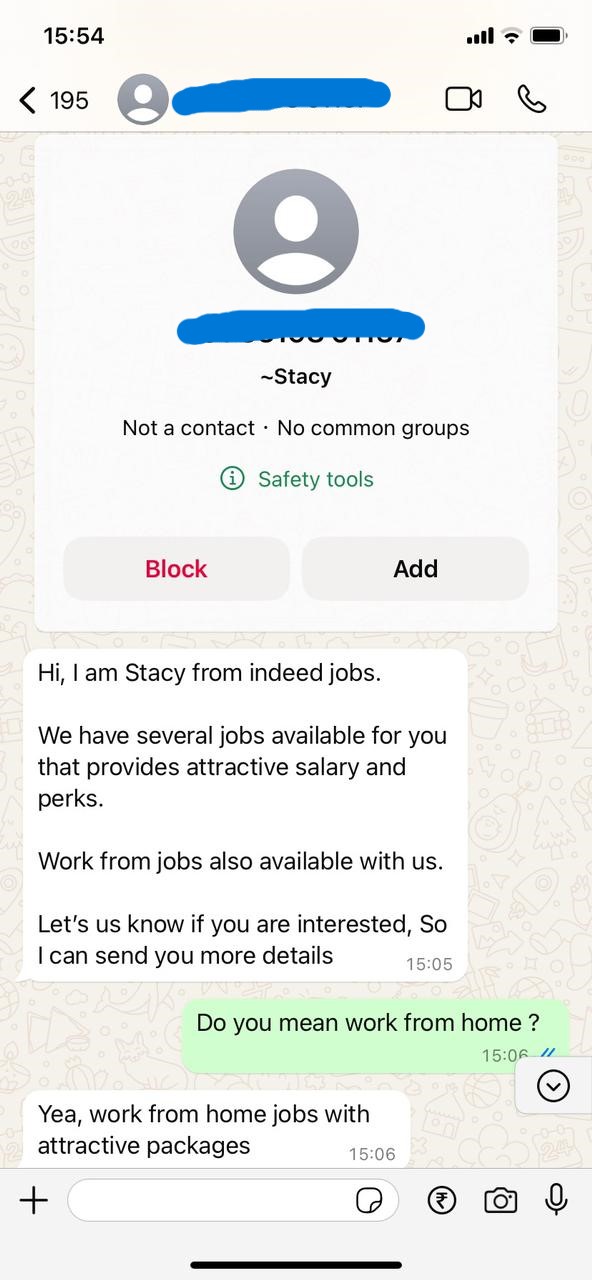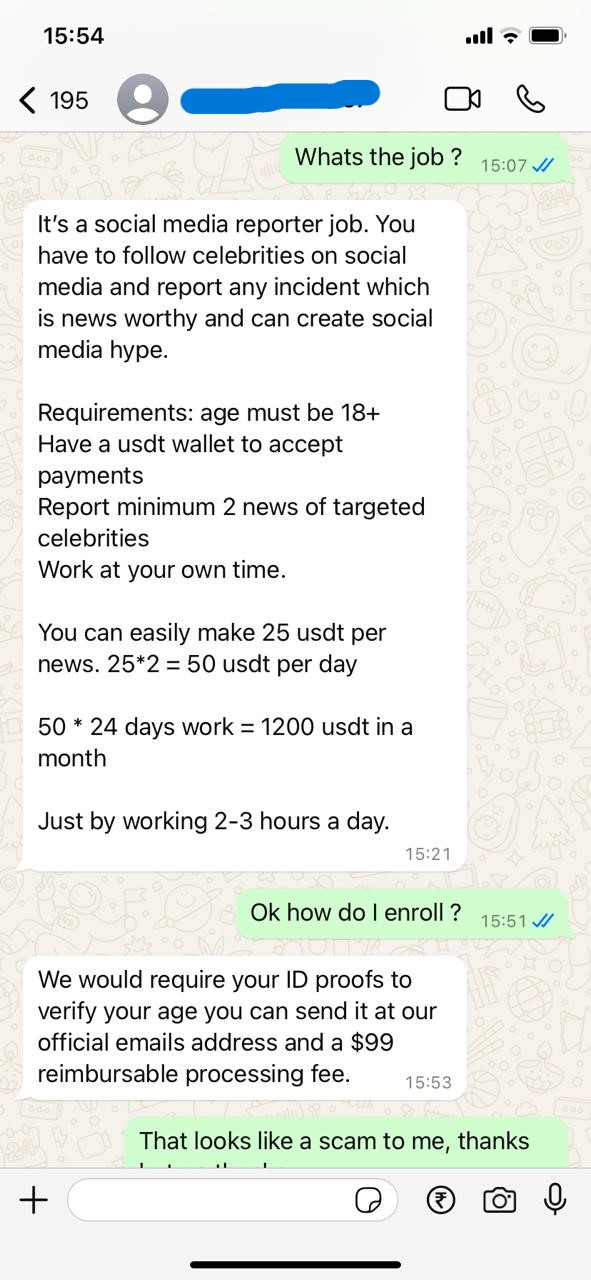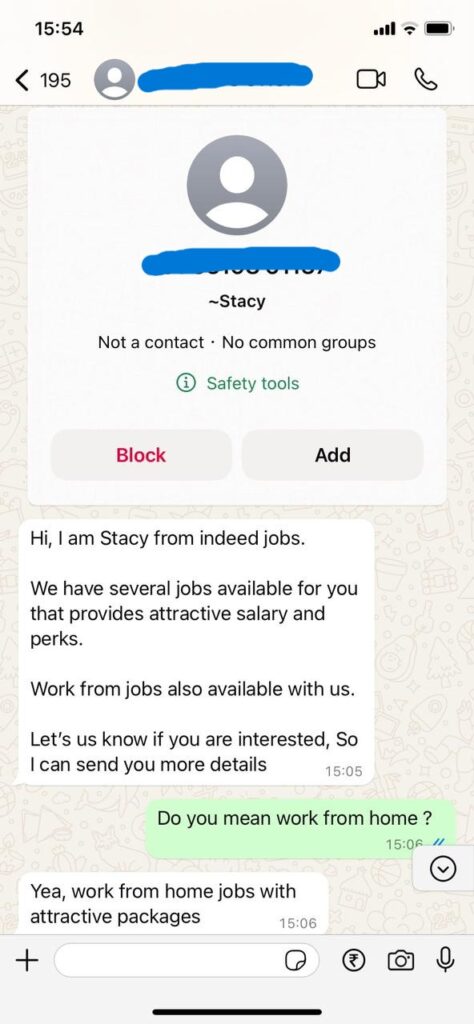Introduction:
The USA has 100 million active WhatsApp users and 6.14 million unemployed people who are actively seeking jobs. Tell this data to a scam boss and what will you get?
Yes, A new Scam.
Call it a WhatsApp job scam, WhatsApp job offer scam, WhatsApp recruitment scam, or job recruitment scam on WhatsApp, it all means the same thing, Scamming people on WhatsApp who are trying to seek employment.
This scam preys on people’s desperation to get employment and the sophisticated implementation makes it effective. Scammers posing as recruiters or HRs of legitimate companies send lucrative job offers to potential victims. Reeling them into a financial trap.
Understanding the Scam:
People receive a message on WhatsApp from someone claiming to be a recruiter, saying they have found their details for a potential job opportunity. This might sound promising, but there’s a critical issue: you never posted your information on any job board or website. This scenario is all too common and is a hallmark of the WhatsApp recruitment scam.
These scams are designed to deceive innocent job seekers into believing they have been selected for a job opportunity. The fraudsters often craft convincing messages and profiles to appear legitimate. However, their ultimate goal is to extract personal information, financial details, or even money from the victims.
Spotting the Red Flags:
To protect yourself from falling victim to these scams, it is essential to recognize the warning signs. Authentic recruiters follow a professional protocol. Legitimate professionals typically initiate contact through a phone call or an official email, especially when they have sourced your details from job boards or professional networks. They provide verifiable contact information and often direct you to the company’s official website or LinkedIn profile.
In contrast, scammers rely solely on WhatsApp messages, bypassing the standard communication channels that legitimate recruiters use. Their messages may contain vague job descriptions, requests for personal information, or links to suspicious websites. Here are some key red flags to watch out for:
- Unsolicited Contact: If you receive a WhatsApp message from a recruiter without having posted your resume or contact information online, be cautious. Legitimate recruiters typically reach out through professional platforms.
- Lack of Professionalism: Authentic recruiters will use official email addresses and provide detailed information about the job and the company. Scammers often use generic or suspicious email addresses and offer little information.
- Immediate Requests for Personal Information: Be wary of recruiters who ask for sensitive information, such as your Social Security number or bank details, early in the conversation. Legitimate recruiters will not request such information upfront.
- Pressure Tactics: Scammers may use high-pressure tactics, urging you to act quickly or risk losing the opportunity. Genuine recruiters understand that job seekers need time to consider offers and will not rush you.
- Too Good to Be True Offers: If the job offer seems too good to be true, with promises of high salaries and benefits with minimal effort, it is likely a scam. Trust your instincts and do thorough research.
A TSP Reader’s Encounter and the Broader Issue:
One of the “The Scam Protector” readers recently experienced this scam firsthand. The reader received a WhatsApp message from someone posing as a recruiter, despite never listing my details online. The message claimed they had good work-from-home job opportunities. Initially, the message seemed plausible, but the fact that the reader had not posted or enquired about job requirements raised suspicions.
When asked about personal information and a processing fee, The Reader realized that this was a fraudulent attempt to obtain his personal information. The message was vague, lacked professional details, and requested personal information early in the conversation. Thankfully, he did not fall for the scam, but the experience highlighted the pervasive nature of these fraudulent activities.
Unfortunately, His experience is not unique. Many job seekers have reported similar encounters, indicating a broader issue that needs to be addressed.


Protecting Yourself from WhatsApp Recruitment Scams:
To safeguard yourself from falling victim to WhatsApp recruitment scams, consider the following steps:
- Verify the Recruiter: Always verify the identity of the recruiter. Check their LinkedIn profile, contact the company directly through official channels, and look for reviews or testimonials from other job seekers.
- Do Not Share Personal Information: Never share sensitive personal information, such as your Social Security number, bank details, or home address, with a recruiter you have not verified.
- Research the Company: Before engaging with a recruiter, research the company they claim to represent. Look for official contact details and reach out to the company to confirm the recruiter’s identity.
- Trust Your Instincts: If something feels off or too good to be true, trust your instincts. Scammers often prey on desperation, so it is crucial to remain cautious and skeptical.
- Report Suspicious Activity: If you encounter a suspected scam, report it to the relevant authorities and the platform (such as WhatsApp) where the scam occurred. This helps protect other job seekers from falling victim to the same scam.
Conclusion:
The rise of WhatsApp recruitment scams is a troubling development in the job market. These scams not only jeopardize the safety and security of job seekers but also erode trust in the recruitment industry. By staying informed, recognizing the red flags, and taking proactive measures to verify recruiters, job seekers can protect themselves from falling victim to these fraudulent activities. Remember, if a job opportunity seems too good to be true, it probably is. Stay vigilant, stay informed, and safeguard your personal information.
At The Scam Protector, We Educate people about online scams and Cybersecurity Every year millions of people fall victim to online scams and suffer financial and emotional damages. These people can be saved if we make them aware of prevalent online scams and the dirty tricks they use to trap innocent people. Join us in the fight against online scams by subscribing to our newsletter and sharing scam-prevention knowledge with people around you. JOIN NOW




